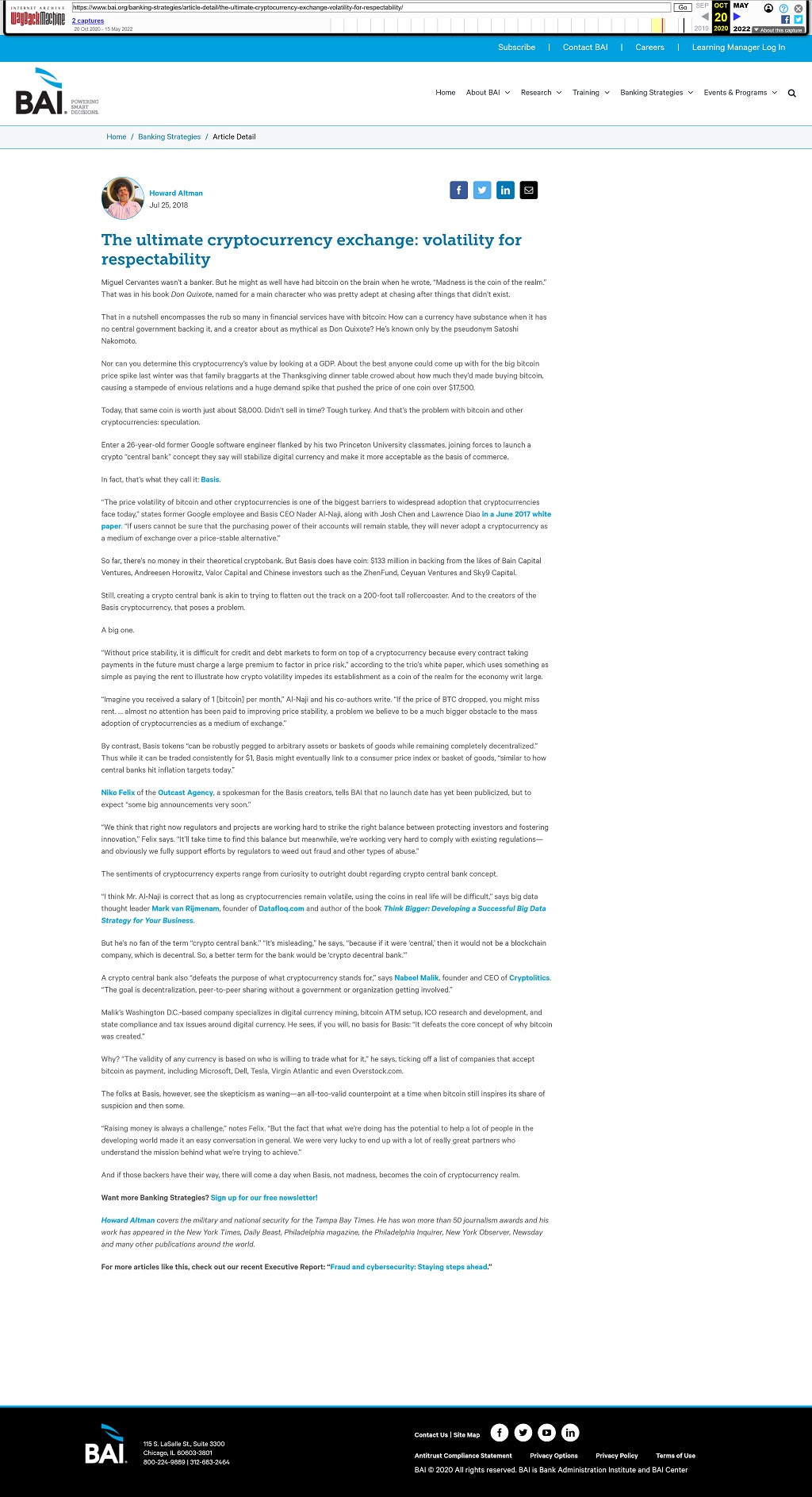BANKING STRATEGIES
Miguel Cervantes wasn’t a banker. But he might as well have had bitcoin on the brain when he wrote, “Madness is the coin of the realm.” That was in his book Don Quixote, named for a main character who was pretty adept at chasing after things that didn’t exist.
That in a nutshell encompasses the rub so many in financial services have with bitcoin: How can a currency have substance when it has no central government backing it, and a creator about as mythical as Don Quixote? He’s known only by the pseudonym Satoshi Nakomoto.
Nor can you determine this cryptocurrency’s value by looking at a GDP. About the best anyone could come up with for the big bitcoin price spike last winter was that family braggarts at the Thanksgiving dinner table crowed about how much they’d made buying bitcoin, causing a stampede of envious relations and a huge demand spike that pushed the price of one coin over $17,500.
Today, that same coin is worth just about $8,000. Didn’t sell in time? Tough turkey. And that’s the problem with bitcoin and other cryptocurrencies: speculation.
Enter a 26-year-old former Google software engineer flanked by his two Princeton University classmates, joining forces to launch a crypto “central bank” concept they say will stabilize digital currency and make it more acceptable as the basis of commerce.
In fact, that’s what they call it: Basis.
“The price volatility of bitcoin and other cryptocurrencies is one of the biggest barriers to widespread adoption that cryptocurrencies face today,” states former Google employee and Basis CEO Nader Al-Naji, along with Josh Chen and Lawrence Diao in a June 2017 white paper. “If users cannot be sure that the purchasing power of their accounts will remain stable, they will never adopt a cryptocurrency as a medium of exchange over a price-stable alternative.”
So far, there’s no money in their theoretical cryptobank. But Basis does have coin: $133 million in backing from the likes of Bain Capital Ventures, Andreesen Horowitz, Valor Capital and Chinese investors such as the ZhenFund, Ceyuan Ventures and Sky9 Capital.
Still, creating a crypto central bank is akin to trying to flatten out the track on a 200-foot tall rollercoaster. And to the creators of the Basis cryptocurrency, that poses a problem.
A big one.
“Without price stability, it is difficult for credit and debt markets to form on top of a cryptocurrency because every contract taking payments in the future must charge a large premium to factor in price risk,” according to the trio’s white paper, which uses something as simple as paying the rent to illustrate how crypto volatility impedes its establishment as a coin of the realm for the economy writ large.
“Imagine you received a salary of 1 [bitcoin] per month,” Al-Naji and his co-authors write. “If the price of BTC dropped, you might miss rent. … almost no attention has been paid to improving price stability, a problem we believe to be a much bigger obstacle to the mass adoption of cryptocurrencies as a medium of exchange.”
By contrast, Basis tokens “can be robustly pegged to arbitrary assets or baskets of goods while remaining completely decentralized.” Thus while it can be traded consistently for $1, Basis might eventually link to a consumer price index or basket of goods, “similar to how central banks hit inflation targets today.”
Niko Felix of the Outcast Agency, a spokesman for the Basis creators, tells BAI that no launch date has yet been publicized, but to expect “some big announcements very soon.”
“We think that right now regulators and projects are working hard to strike the right balance between protecting investors and fostering innovation,” Felix says. “It’ll take time to find this balance but meanwhile, we’re working very hard to comply with existing regulations—and obviously we fully support efforts by regulators to weed out fraud and other types of abuse.”
The sentiments of cryptocurrency experts range from curiosity to outright doubt regarding crypto central bank concept.
“I think Mr. Al-Naji is correct that as long as cryptocurrencies remain volatile, using the coins in real life will be difficult,” says big data thought leader Mark van Rijmenam, founder of Datafloq.com and author of the book Think Bigger: Developing a Successful Big Data Strategy for Your Business.
But he’s no fan of the term “crypto central bank.” “It’s misleading,” he says, “because if it were ‘central,’ then it would not be a blockchain company, which is decentral. So, a better term for the bank would be ‘crypto decentral bank.’”
A crypto central bank also “defeats the purpose of what cryptocurrency stands for,” says Nabeel Malik, founder and CEO of Cryptolitics. “The goal is decentralization, peer-to-peer sharing without a government or organization getting involved.”
Malik’s Washington D.C.-based company specializes in digital currency mining, bitcoin ATM setup, ICO research and development, and state compliance and tax issues around digital currency. He sees, if you will, no basis for Basis: “It defeats the core concept of why bitcoin was created.”
Why? “The validity of any currency is based on who is willing to trade what for it,” he says, ticking off a list of companies that accept bitcoin as payment, including Microsoft, Dell, Tesla, Virgin Atlantic and even Overstock.com.
The folks at Basis, however, see the skepticism as waning—an all-too-valid counterpoint at a time when bitcoin still inspires its share of suspicion and then some.
“Raising money is always a challenge,” notes Felix. “But the fact that what we’re doing has the potential to help a lot of people in the developing world made it an easy conversation in general. We were very lucky to end up with a lot of really great partners who understand the mission behind what we’re trying to achieve.”
And if those backers have their way, there will come a day when Basis, not madness, becomes the coin of cryptocurrency realm.
- BAI: https://www.bai.org/banking-strategies/article-detail/the-ultimate-cryptocurrency-exchange-volatility-for-respectability/
- Internet Archive: https://web.archive.org/web/20201020172141/https://www.bai.org/banking-strategies/article-detail/the-ultimate-cryptocurrency-exchange-volatility-for-respectability/


